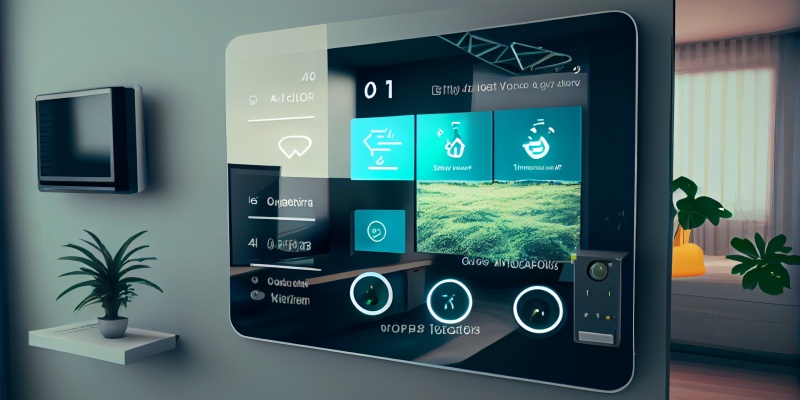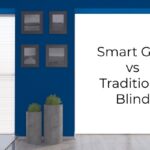Smart glass and smart film are two technological innovations that are changing the way we think about windows and glazing in buildings. While both offer unique advantages and are designed to provide privacy and energy efficiency, there are differences between the two.
In this article, we will explore the comparison of Smart Glass vs Smart Film, their applications, and which is better for specific use cases.
What is Smart Glass?
Smart glass, also known as switchable glass, is a type of glass that can be electronically controlled to change its transparency from clear to opaque. Smart glass is made by placing a layer of liquid crystal film or electrochromic materials between two sheets of glass. When an electric current is applied, the liquid crystals or electrochromic materials align, changing the transparency of the glass.
What is Smart Film?
The smart film, also known as switchable film, is a type of film that can be applied to existing windows to make them switchable. Smart film is made of polymer-dispersed liquid crystals (PDLCs) that are encapsulated between two layers of clear polyester film. When an electric current is applied, the PDLCs align, changing the transparency of the film.
How do they work?
Both smart glass and smart film work in a similar way by using electricity to control the alignment of liquid crystals or electrochromic materials. Smart glass is made by sandwiching a layer of these materials between two glass sheets, while smart film is made by encapsulating the materials between two layers of film. Both technologies can be controlled through mobile apps, switches, and voice commands.
Smart Glass vs Smart Film: Comparison

Smart glass and smart film both offer benefits for different use cases. Here you can check 10 Comparisons between Smart Glass vs Smart Film.
Cost Comparison: Smart Glass vs Smart Film
When it comes to cost, smart film is generally considered more affordable than smart glass. This is because smart glass requires more complex production processes and technology, making it a more expensive option. However, it’s important to consider the long-term savings that can be achieved with smart glass due to its energy efficiency properties. In addition, retrofitting existing windows with smart film may require additional costs for installation and maintenance.
Energy Efficiency: Smart Glass vs Smart Film
Smart glass offers better energy efficiency than smart film because it blocks out sunlight and regulates temperature. This helps to reduce energy consumption and associated costs, making smart glass a popular option for green building projects. On the other hand, the smart film provides some energy efficiency benefits by reducing the need for blinds or curtains, which can trap heat and affect indoor temperature.
Response Time: Smart Glass vs Smart Film
The response time for Smart glass and Smart film are Same and both can switch between clear and opaque modes very quickly. This can be important in situations where privacy or light control is needed, such as in conference rooms or medical facilities.
Versatility: Smart Glass vs Smart Film
Smart film is a more versatile option than smart glass because it can be applied to a variety of surfaces, including curved or irregularly shaped windows. This makes it a popular choice for unique architectural designs and retrofitting projects. Smart glass, on the other hand, is limited to flat surfaces and may require specialized production processes for non-standard shapes.
Aesthetic Appeal: Smart Glass vs Smart Film
Both smart glass and smart film offer aesthetic benefits by providing a sleek and modern look to windows. Smart glass can be customized with different tint levels and patterns, while the smart film can be customized with various designs and colors. The choice between the two options depends on personal preferences and the desired look and feel of the space.
Durability: Smart Glass vs Smart Film
Smart glass is generally considered more durable than smart film due to its thicker construction and higher resistance to scratches and other forms of damage. Smart film is thinner and more susceptible to damage from external factors such as weather or accidental impact. However, advancements in smart film technology have improved its durability in recent years.
Maintenance: Smart Glass vs Smart Film
Both smart glass and smart film require some level of maintenance to ensure optimal performance. Smart Film may require more maintenance due to its complex technology and higher susceptibility to damage and may require periodic replacement due to wear and tear.
Privacy: Smart Glass vs Smart Film
Both smart glass and smart film offer privacy benefits by allowing windows to switch between clear and opaque modes and both the technologies offers the same level of privacy
Sound Insulation: Smart Glass vs Smart Film
Smart glass offers better sound insulation properties than smart film due to its thicker construction and ability to block out more noise. This can be an important factor in environments where noise reduction is important, such as in office buildings or near busy roads. The smart film can still provide some level of sound insulation but may not be as effective as smart glass.
Applications of Smart Glass and Smart Film

Some of the applications of smart glass and smart film are as follows:
Home and Office
Smart glass and film improve privacy and light control in homes and offices. Great for conference rooms, bathrooms, and skylights. They regulate sunlight and heat, saving energy.
Hospitality and Retail
Smart glass and smart film are transforming hospitality and retail. They provide privacy in hotel rooms and storefronts and create private dining areas in restaurants.
Healthcare
Smart glass and film are improving patient comfort and privacy in healthcare. They can be used in patient rooms, operating rooms, and waiting areas to offer privacy and improve visibility.
Security
Smart glass and film are used for privacy and protection in secure facilities, military settings, banks, and retail stores.
Comparisons Of PDLC Smart Glass vs PDLC Smart Film
PDLC technology is used in both smart glass and smart film. PDLC smart glass is more expensive than PDLC smart film and is typically used for larger windows and skylights.
Check a few amazing comparisons of PDLC Smart Glass vs PDLC Smart Film.
Cost Comparison: PDLC Smart Glass vs PDLC Smart Film
- PDLC smart film is generally less expensive than PDLC smart glass
Installation Process: PDLC Smart Glass vs PDLC Smart Film
- PDLC smart glass requires professional installation, as it is installed as a whole panel.
- Installation of PDLC smart film requires more professional Support because of the Installation Complexities.
Privacy: PDLC Smart Glass vs PDLC Smart Film
- PDLC smart glass and PDLC smart film offer a great solution for achieving privacy as they can easily switch from opaque to transparent with just a push of a button.
Conclusion
We have covered a detailed guide on Smart Glass vs Smart Film. Smart glass and smart film are two innovative technologies that are changing the way we think about windows and glazing. While both offer unique advantages, they have differences that make them more suitable for specific use cases. Whether you are looking to enhance privacy, energy efficiency, or overall comfort, smart glass and smart film can offer solutions for various applications.
FAQs
What is a smart window, and how does it work?
A smart window is a window that can change its tint or transparency level with the use of technology such as electrochromic or thermochromic materials. It works by adjusting the voltage or temperature applied to the glass.
What are the benefits of installing a smart window?
Some benefits of a smart window include energy savings, privacy control, glare reduction, and improved comfort and aesthetics.
Can smart glass and smart film be controlled through mobile apps?
Yes, smart glass and smart film can be controlled through mobile apps and switches.
Can a smart window be retrofitted into existing buildings, or do they require new construction?
A Smart window can be retrofitted into existing buildings, but the process may be more complex and costly than installing them in new construction.
What is smart glazing, and how is it different from regular glass?
Smart glazing is a type of glass that can change its properties in response to environmental conditions or user controls. It differs from regular glass by incorporating technologies such as electrochromic, photochromic, or liquid crystal materials.
What types of smart glazing are available, and which is best for my project?
Different types of smart glazing are available, including switchable, self-tinting, and self-cleaning glass. The best option for a project will depend on factors such as the desired functionality, location, and budget.
How does smart glazing contribute to energy efficiency and sustainability in buildings?
Smart glazing can contribute to energy efficiency and sustainability in buildings by reducing heat gain and loss, minimizing the need for artificial lighting, and improving indoor air quality.





